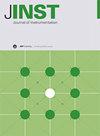Development of a high-voltage radio frequency power supply for quadrupole mass spectrometers with a wide dynamic measurement range
IF 1.3
4区 工程技术
Q3 INSTRUMENTS & INSTRUMENTATION
引用次数: 0
Abstract
The core component of a quadrupole mass spectrometer is the quadrupole mass filter, serving a crucial role in ion analysis. It operates by applying two sets of high-voltage, high-frequency signals with equal amplitude and opposing phases through the radio frequency power supply, capitalizing on variations in the electric field and differences in mass-to-charge ratios to separate incoming ions. This study leverages direct digital frequency synthesis technology and multi-stage voltage amplification techniques to design a tailored radio frequency power supply for quadrupole mass spectrometers with a broad mass range. Practical testing demonstrates that this power supply generates radio frequency high-voltage signals with a peak-to-peak voltage ranging from 2.210 V to 4.220 kV at a resonant frequency of 1.240 MHz, facilitating the separation of ions with distinct m/z values. Furthermore, the radio frequency power supply is integrated into a Self-developed quadrupole mass spectrometer, enabling an assessment of the mass range, resolution, stability of the spectrometer. The results of these assessments confirm that the developed power supply accommodates scanning of m/z value ions in the range of 1 to 1067 while maintaining an absolute resolution of less than m/z = 1 units and an instrument stability of 2.00% over four hours.and keywords.为具有宽动态测量范围的四极杆质谱仪开发高压射频电源
四极质谱计的核心部件是四极质过滤器,在离子分析中起着至关重要的作用。它的工作原理是通过射频电源施加两组振幅相等、相位相反的高压高频信号,利用电场的变化和质荷比的差异来分离进入的离子。本研究利用直接数字频率合成技术和多级电压放大技术,为宽质量范围的四极杆质谱仪设计了量身定制的射频电源。实际测试表明,该电源在谐振频率为1.240 MHz的情况下产生峰值电压为2.210 V ~ 4.220 kV的射频高压信号,有利于m/z值不同的离子的分离。此外,射频电源集成到自主开发的四极杆质谱仪中,可以对光谱仪的质量范围,分辨率和稳定性进行评估。这些评估的结果证实,开发的电源可以在1到1067的范围内扫描m/z值离子,同时保持小于m/z = 1单位的绝对分辨率和仪器在4小时内2.00%的稳定性。和关键词。
本文章由计算机程序翻译,如有差异,请以英文原文为准。
求助全文
约1分钟内获得全文
求助全文
来源期刊

Journal of Instrumentation
工程技术-仪器仪表
CiteScore
2.40
自引率
15.40%
发文量
827
审稿时长
7.5 months
期刊介绍:
Journal of Instrumentation (JINST) covers major areas related to concepts and instrumentation in detector physics, accelerator science and associated experimental methods and techniques, theory, modelling and simulations. The main subject areas include.
-Accelerators: concepts, modelling, simulations and sources-
Instrumentation and hardware for accelerators: particles, synchrotron radiation, neutrons-
Detector physics: concepts, processes, methods, modelling and simulations-
Detectors, apparatus and methods for particle, astroparticle, nuclear, atomic, and molecular physics-
Instrumentation and methods for plasma research-
Methods and apparatus for astronomy and astrophysics-
Detectors, methods and apparatus for biomedical applications, life sciences and material research-
Instrumentation and techniques for medical imaging, diagnostics and therapy-
Instrumentation and techniques for dosimetry, monitoring and radiation damage-
Detectors, instrumentation and methods for non-destructive tests (NDT)-
Detector readout concepts, electronics and data acquisition methods-
Algorithms, software and data reduction methods-
Materials and associated technologies, etc.-
Engineering and technical issues.
JINST also includes a section dedicated to technical reports and instrumentation theses.
 求助内容:
求助内容: 应助结果提醒方式:
应助结果提醒方式:


